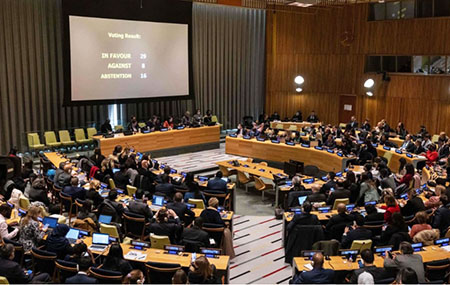Special to WorldTribune.com
In a hugely symbolic but stinging rebuke, the Islamic Republic of Iran has been expelled from the UN’s Commission on Women’s Rights. The vote in the 54-member Economic and Social Council (ECOSOC) came amid growing global outrage at the Iranian regime’s brutal and bloody crackdown on widening demonstrations across the country in protest to the theocratic regime’s restrictions on women’s rights and freedoms.
The resolution, backed by the United States, supported the action to remove Iran from the Commission on the Status of Women for the remainder of its four-year term ending in 2026. The development comes in the wake of the Teheran regime’s brutal crackdown on protests and calls for justice for Mahsa Amini, a 22-year-old Kurdish woman who died in custody of the infamous “morality police.” She was accused of not wearing her hijab headscarf properly.

U.S. Amb. Linda Thomas-Greenfield commented, “Iran’s membership at this moment is an ugly stain on the Commission’s credibility.”
The recorded vote was 29 in favor, 8 against and with 16 abstentions. The Yes votes supporting the resolution included among others the United States, Austria, Canada, France, Japan and South Korea. Equally Croatia, Czech Republic, Guatemala and Israel joined.
The no votes comprised the usual suspects including China, Kazakhstan, Nicaragua, Russia and Zimbabwe.
Again the 16 abstentions were interesting including Mexico, India, Indonesia and Thailand.
As expected, Iran’s UN representatives “categorically and strongly condemned” the action.
The resolution rebuked the Iranian Government’s actions since September 2022, “to continuously undermine and increasingly suppress the human rights of women and girls”, and “often with the use of excessive force.” The document moreover decries, “the use of lethal force resulting in the deaths of peaceful protesters, including women and girls.”
As United Kingdom Amb. Barbara Woodward stated, “The severity of Iran’s brutal and disproportionate state-sponsored use of force against protesters calling for ‘Woman, Life, Freedom’ over the past several weeks have appalled the world.” She added, “Here at the UN, we cannot sit by and allow the violence that led to the arrest and death of Mahsa Amini to continue with impunity.”
Think about it for a moment; why are Iran’s Mullah’s represented on a Women’s rights committee in the first place?
The Islamic Republic of Iran has long been designated as a state sponsor of terrorism; Witness
its military meddling and support of Hizbullah terrorists in Lebanon or the significant military support of Revolutionary Guard units deployed in Syria. And most recently Iran has supplied lethal military drones for Moscow’s assault on Ukrainian cities. But what we are now witnessing is a wider domestic crackdown in Iran aimed at those, including many women, not following the diktat of the Islamic guardians.
Just recently a top Iranian actress Taraneh Alidoosti was arrested and detained for among other things, condemning the execution of Moshen Shekari who was hanged last week. She criticized some international organizations for not taking a forceful stand against the Tehran regime.
In another recent incident, Dr. Ayda Rostami, a Teheran physician, was found dead after she had been seen visiting injured protesters in hospital. This represents the kind of silent hand killings where people who oppose the regime, disappear and are later found dead.
In the meantime, the protests continue. More than 500 people have been killed since the demonstrations began in September, according to Human Rights Activists in Iran, a group that monitors the situation. At least 18,200 people have been detained by the authorities.
Amb. Thomas-Greenfield called the vote “historic,” the first-ever ouster of a commission member saying it was “the right thing to do.” The ambassador later told the media, “I think we sent a strong message to the Iranian government, and we sent a strong message to Iranian women.”
Thus, more than forty-three years since the Iranian Revolution which ushered in this theocracy and destabilizing force in the Middle East, many governments and human rights groups now finally seem serious about pressuring the mendacious Mullahs in Teheran. It’s about time!
John J. Metzler is a United Nations correspondent covering diplomatic and defense issues. He is the author of Divided Dynamism the Diplomacy of Separated Nations: Germany, Korea, China (2014). [See pre-2011 Archives]

 By
By